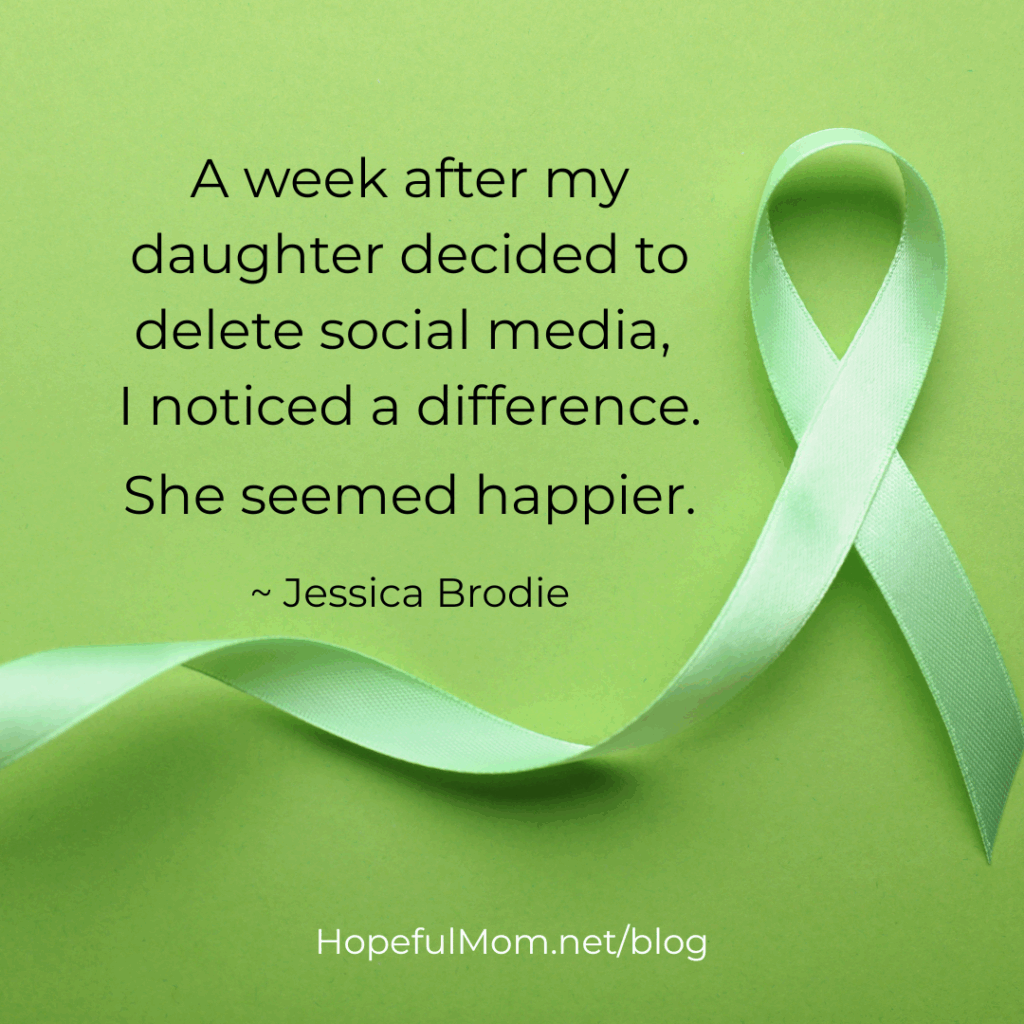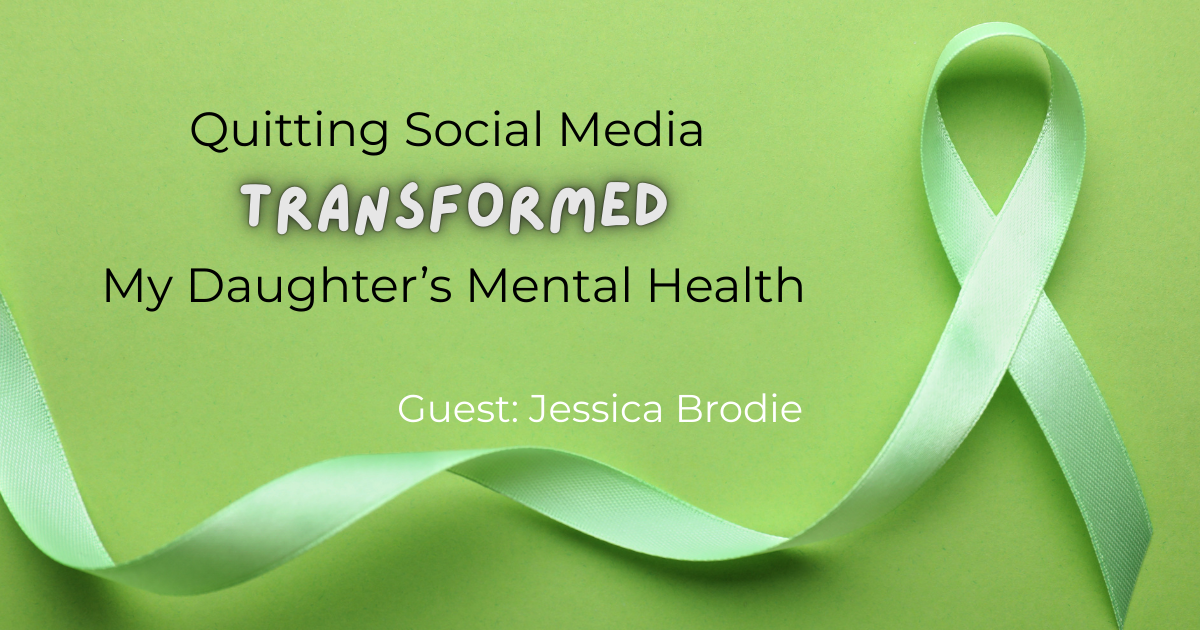It’s a privilege to welcome back Jessica Brodie as our guest author. She cares for those struggling with mental health. I love her thoughts and advice concerning teens, social media, and mental health. Jessica’s debut book released last month. Find it here.
It started slowly at first, sneaking up on me. My confident, boss-lady daughter struggled with anxiety and panic attacks for years, but she was still self-assured and likable, and she still seemed to like herself.
Then puberty hit, and with it, the pandemic. About that same time, she’d reached the age where it seemed OK to let her have a cell phone—carefully moderated, of course, with all the requisite parental controls, privacy restrictions, and other important instructions, like “no direct messaging” and “don’t give out your personal info.” I didn’t think it was a problem to let her get TikTok and Instagram as long as her accounts were private.
But then I noticed a change in her clothing. She wanted her tops a little more cropped and her jeans a little more snug. She spent more time looking in the mirror, posing for an invisible audience. We started having tension about what kind of clothes were appropriate for her to wear, what kind of pictures were appropriate to take and post online, what kind of dances she was learning on some of the new apps.
Then she became weight conscious, eating less at meals and sometimes insisting she just wasn’t hungry. She begged me to let her get highlights in her hair and acrylic nails.
"My once confident daughter struggled with anxiety and panic attacks because of social media." Jessica Brodie tells us why her daughter quit and offers parents tips. Quitting Social Media Transformed My Daughter’s Mental Health… Share on XI chalked it up to her age, to being in middle school now.
I didn’t see the impact social media was having on her self-esteem, her worldview, her perspective, or her mental health.
In retrospect, I would’ve done things far differently, but I didn’t know. Most of us don’t know.
“I don’t want to shelter her. I want to give her room to make mistakes in a safe environment,” I rationalized. “I want to raise her in a godly and Christian way, but with enough freedom that when she gets old enough to go out in the world, she’ll know how to make good choices.”
I thought a little social media usage wasn’t a big deal.
I didn’t understand back then the power social media had to influence my sweet daughter, to lure her into new and dangerous thought patterns. I didn’t realize other dangers she was exposed to just by being on these apps.
Soon she was comparing herself nonstop. If she wasn’t trying to imitate what she saw online, she was lamenting that her life didn’t look like other people’s lives—we didn’t have a boat, we didn’t go on vacations to tropical islands like “all her friends.” Mind you, I knew her friends, and I knew none of them had boats or vacationed on tropical islands.
All of this came from what she saw other girls her age posting on social media.
And it did a number on her self-esteem and her mental health during a time when she was already struggling with depression and anxiety. It became a perfect storm that crashed violently all at once, and it took years to get her healthy again.
The Decision
I wish I could say I wised up, but it was my daughter who finally suggested she delete all social media from her phone and close her accounts.
A week later, I noticed a difference. She seemed happier in her own skin, not nearly as moody or volatile. Two weeks later, I saw even more improvement.
Since then, we’ve done experiments. She’s a few years older now, and we’re starting to look at colleges. A couple of times over the years we’ve decided to experiment and let her get Instagram again. Yet after just a few days, we can all see a big difference in her mood and her level of comparing herself to others. She can see it, too. And so we delete the app once more, and all becomes well again.

The Comparison Game
Comparison is good for none of us. We look at other people and think what we see is reality. We see someone sharing about their seemingly perfect life, and we don’t know that two feet away there’s a mess in their kitchen because all we see is the clutter-free camera-worthy area behind them. We don’t see that someone was able to afford that fancy vacation by maxing out their credit cards. We don’t know the pain it took them to get to this place in life. We don’t know the whole story.
Instead, we look at other people’s lives and sometimes feel badly about our own. We wonder why we don’t have this or that, or why we are not at this place in our own lives.
Imagine the impact it has on a young and impressionable girl who is still trying to figure out her own identity. Imagine all the lies being fed into her soul as she struggles to understand the difference between truth and fiction and her own place in this world.
Yes, I know the world is increasingly online. And I know there are beautiful aspects of social media.
But in our house, for our family, it’s drastically limited. It had a hugely negative effect on my daughter, and it took me far too long to recognize it.
Banning social media is not for every family. But if you are reading this and have been feeling a nudge from God, maybe this is your answer, like it was ours.
Here are a few tips that might help:
- Talk openly with your teen. Tell them why you’re concerned or want to do this. Genuine reasons speak volumes.
- Propose a social media vacation or break for a week or two to experiment with or assess how they feel without it.
- Establish ground rules and use parental control settings. Typically the parent owns the phone and is the account holder on the plan, so it’s your right to take control if your child lives under your roof.
- Remember that even if it seems like the whole world is on social media, they’re not. As Christians, we’re called to be different and not like the world.
- Help your child find alternatives to spending time on social media, such as reading, exercise, or connecting with people in real life.
- Model the behavior yourself.
- Understand that kids can access most social media from a website, even if they don’t have an app. They can also create a secret account and block you from being able to view it.
Try it and see what happens. Try it even if your child doesn’t take the lead like my daughter did—even if you look like the “bad guy.” You might find it is an answered prayer and a solution that on its surface seems way too simple but in reality is the very thing you need.
Please subscribe to Hopeful Mom for two FREE PDF downloads: 7 Steps After Your Child Sees Porn AND Sexpectations Reflection Questions. For information on modeling habits of healthy relationships, read Sexpectations: Helping the Next Generation Navigate Healthy Relationships.
About the author

Jessica Brodie
Jessica Brodie is an award-winning Christian novelist, journalist, editor, blogger, and writing coach. Find her debut novel, The Memory Garden, on Amazon and wherever books are sold. She is also the editor of the South Carolina United Methodist Advocate, the oldest newspaper in Methodism. Learn more about Jessica’s writing and ministry and read her faith blog at http://jessicabrodie.com. She has a weekly YouTube devotional and podcast. You can also connect with her on Facebook, Twitter, and more. She’s also produced a free eBook, A God-Centered Life: 10 Faith-Based Practices When You’re Feeling Anxious, Grumpy, or Stressed.


